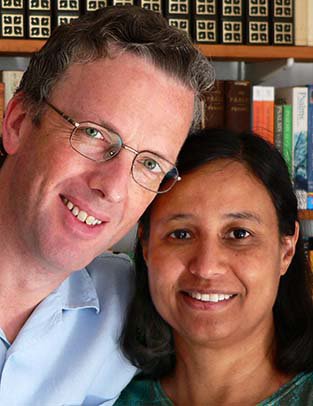Tuesday, August 29, 2006
Visit to Eduardo Luis Magalhães, Bahia
Our visit to Bahia was very intense and tiring, and a great joy and success. The travelling went well, with good fellowship in Brasília on both the outward and homeward journeys. We nearly missed the plane home because Andrew thought we were going via São Paulo, and not Curitiba, but this is the fruit of preacher's tiredness, a night of bus travel and advancing years, and the Lord saw to it that we made it home!
The church put us up in a hotel, which was convenient and pleasant, and did not diminish the fellowship and friendship with many from the church.
The ministry went well. The two sessions with the pastors were reasonably well attended, with men coming from all the churches of the Presbytery, and some baptists and other denominations from the town being represented.
In the anniversary meetings, Andew tried to emphasise the centrality of the word in the life of the church. He preached two old favourites and a brand new one - abourt par for the course! The oldies were Psalm 100 and the Grass Sermon, and the new one was an overview of Romans, starting with the question, "Why did Paul write this book?"
The town itself was very interesting. It was the church's 7th anniversary, and the town is the same age, under this name. Seven years ago it was a tiny community, but now has 40 000 inhabitants. The reason is money: massive investment in mechanised agriculture, principally by Southern Brazilians from Paraná and Rio Grande do Sul. One result is a strange apartheid in the town: the incoming southerners have the money and their own lifestyle. They have a Lutheran church. They tend to go to the same restaurants and bars. They are apparently more closed to the gospel. They are also in general white and more European than the locals. We have never seen a situation quite like it in this country.
What was exciting to see was the sense of development and progress. Other Brazilian towns have unpaved roads because there is no money or investment. Luis Eduardo Magalhães has few paved roads because everything has been built so recently and fast that there has been no time to get everything sorted. The massive silos, warehouses and lorries bear witness to the sheer quantity of soya, coffee and other products coming out of the surrounding land. And this despite the fact that for the last three years growth has slowed because the weakness of the dollar has reduced the exporting farmers’ profits.

The Presbyterian Church, Luis Eduardo Magalhães, seen from space. The building has a car park on the left, with the pastor's home adjacent on the right.

The Catholic Church in the town centre.
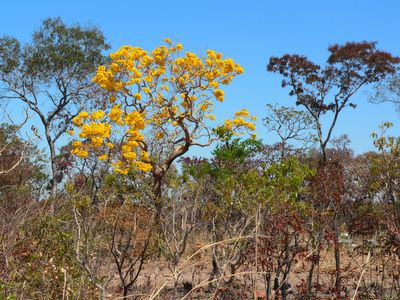
The scrubby natural vegetation around Luis Eduardo Magalhães, before clearing for farming, has many examples of the magnificent Ipê tree, the national tree of Brazil. It is just SO yellow!

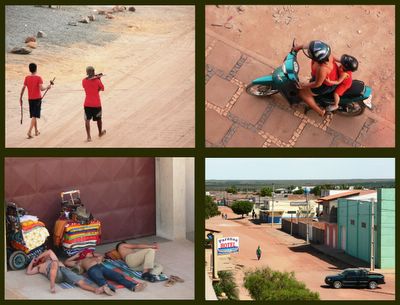
People in the town.


Flat land. Big skies.
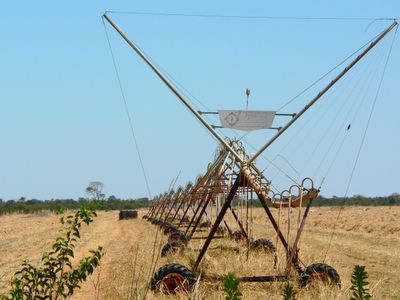
Very often we see the huge irrigation circles as we fly over the centre of the country. This time we were on the ground, and able to appreciate the scale close up. Eleven towers carry the pipes, each tower individually powered to irrigate a circle covering around 140 hectares.

Everything in the town seems to be related to large scale agriculture, or to the maintenance of the machines that do the work.
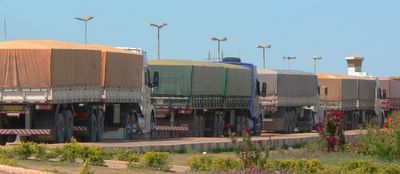
Lorries. The sheer scale of the agricultural output of the region came home to us when we told that this was totally "off-peak" lorry traffic.
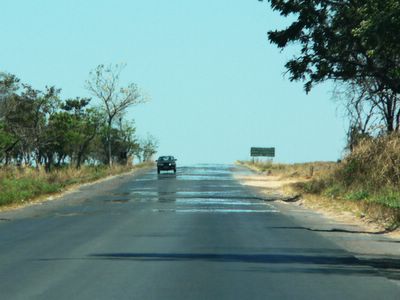
Country Road
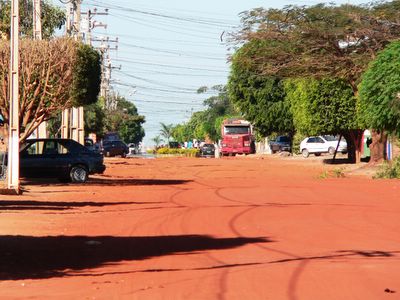
Town Road

Kids in the street. But not street kids. Eduardo Luis Magalhães has some unemployment, mainly due to manual labourers who have migrated in, having heard of the big farming money in the area, only to discover that all is so mechanised there are not many jobs. But of homelessness and urban poverty there is none.
Acaba Vida Waterfall
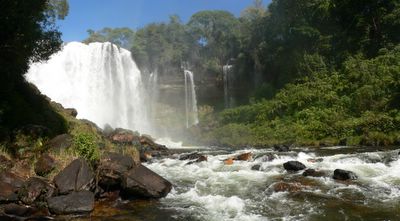

On the Saturday morning (with an afternoon and evening of teaching ahead) we did the mad thing and drove an hour out of town to the Acaba Vida water fall. The falls are stunning: the company and kindness of Mauriso and Ester no less so.
Acaba Vida means "End Life".
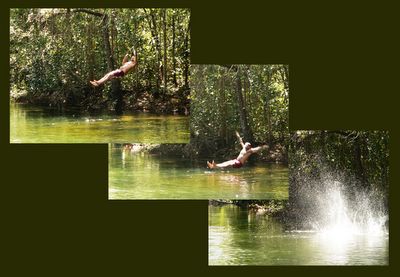
Mauriso arrived ready to get wet. We did not. The main point of waterfalls in Brazil is to jump into the water (above or below the falls, it seems!) preferably with the benefit of jungle vines.

A true jungle explorer.
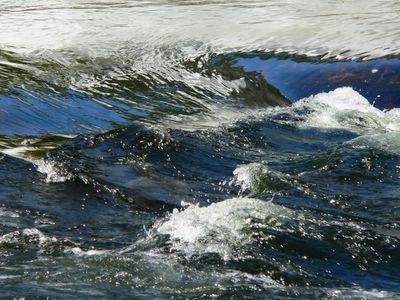

I last saw this species on the Argentinian side of the Iguaçu falls with my sister Naomi - and we didn't get a very satisfactory photo. It still isn't perfect, but it gives some idea of the amazingly coloured and shaped butterfly.


On Saturday night, after the afternoon session for pastors and the evening anniversary meeting, we went out for a "Rodízio de Pizza." This means that you pay a flat rate, and the waiters just keep bringing the food. The waiters at this particular place have a fine line in patter, working hard to "sell" as much as they can. This may not be appear to be in the best interests of the proprietors, but it is hugely entertaining, and everyone speaks of this "service" as being one of the attractants, so the owners do all right in the end. As well as giving us the good stuff, this particular guy spoke with excellent humour of the not so good. On arriving with some lasanha which had clearely been out of the oven for a while. "Lasanhã deliciosa - é um semi novo!" Delicious lasanhã - nearly new.
Ministry at the Presbyterian Church, Luis Eduardo Magalhães.


Pastor José Hugo and his wife Adriana. We met for the first time during the weekend: empathy and friendship came fast. I hope it is not long till we meet again.

The pastors from the presbytery who came together for the anniversary, the teaching on exposition, and for a presbytery meeting. It is worthwhile making the most of the time together: some had travelled more than 400 miles.

Morning congregation
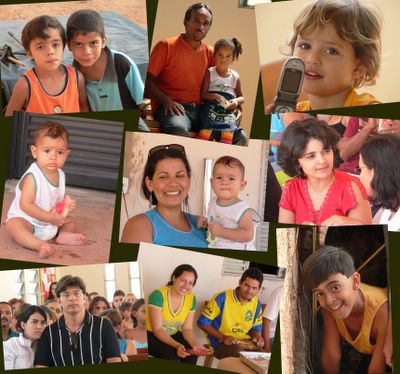
People at the church.

Sunday evening congregation.
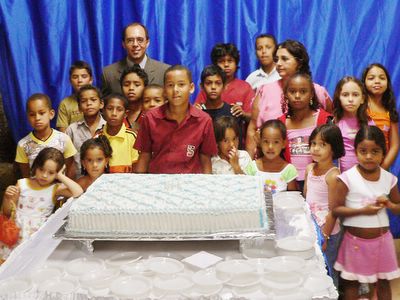
No church anniversary would be complete without cake: Pastor Hugo with a bunch of the church's many children.

Mauriso, Ester and their four excellent daughters. This couple showed us so much love, generosity and encouragement.
The Long Journey Home
We got the bus at 11.00 at night, getting into Brasília at 6.00 a.m. Andrew slept quite a bit: basically though getting on the bus in a state of total exhaustion. It's the only way!

Brasília bus station, 6:00 a.m.

Isaías e Talita. Isaías, an Independent (Charismatic) Baptist Theologian met us at the bus station and opened his home to us: a great breakfast and welcome shower! It was the first time we had met Talita, his wife.
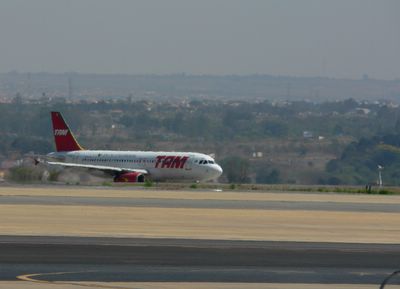
A TAM airbus melts on the runway at Brasília airport.
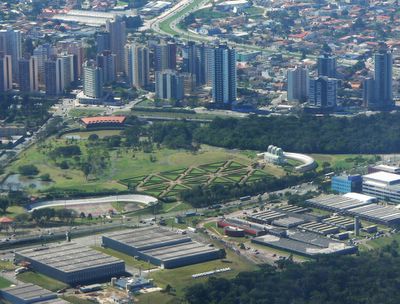
Flying into Curitiba, prior to changing planes for Florianópolis, we passed the Botanical Gardens and Palm House, modelled on Kew.
Our visit to Bahia was very intense and tiring, and a great joy and success. The travelling went well, with good fellowship in Brasília on both the outward and homeward journeys. We nearly missed the plane home because Andrew thought we were going via São Paulo, and not Curitiba, but this is the fruit of preacher's tiredness, a night of bus travel and advancing years, and the Lord saw to it that we made it home!
The church put us up in a hotel, which was convenient and pleasant, and did not diminish the fellowship and friendship with many from the church.
The ministry went well. The two sessions with the pastors were reasonably well attended, with men coming from all the churches of the Presbytery, and some baptists and other denominations from the town being represented.
In the anniversary meetings, Andew tried to emphasise the centrality of the word in the life of the church. He preached two old favourites and a brand new one - abourt par for the course! The oldies were Psalm 100 and the Grass Sermon, and the new one was an overview of Romans, starting with the question, "Why did Paul write this book?"
The town itself was very interesting. It was the church's 7th anniversary, and the town is the same age, under this name. Seven years ago it was a tiny community, but now has 40 000 inhabitants. The reason is money: massive investment in mechanised agriculture, principally by Southern Brazilians from Paraná and Rio Grande do Sul. One result is a strange apartheid in the town: the incoming southerners have the money and their own lifestyle. They have a Lutheran church. They tend to go to the same restaurants and bars. They are apparently more closed to the gospel. They are also in general white and more European than the locals. We have never seen a situation quite like it in this country.
What was exciting to see was the sense of development and progress. Other Brazilian towns have unpaved roads because there is no money or investment. Luis Eduardo Magalhães has few paved roads because everything has been built so recently and fast that there has been no time to get everything sorted. The massive silos, warehouses and lorries bear witness to the sheer quantity of soya, coffee and other products coming out of the surrounding land. And this despite the fact that for the last three years growth has slowed because the weakness of the dollar has reduced the exporting farmers’ profits.

The Presbyterian Church, Luis Eduardo Magalhães, seen from space. The building has a car park on the left, with the pastor's home adjacent on the right.

The Catholic Church in the town centre.

The scrubby natural vegetation around Luis Eduardo Magalhães, before clearing for farming, has many examples of the magnificent Ipê tree, the national tree of Brazil. It is just SO yellow!


People in the town.


Flat land. Big skies.

Very often we see the huge irrigation circles as we fly over the centre of the country. This time we were on the ground, and able to appreciate the scale close up. Eleven towers carry the pipes, each tower individually powered to irrigate a circle covering around 140 hectares.

Everything in the town seems to be related to large scale agriculture, or to the maintenance of the machines that do the work.

Lorries. The sheer scale of the agricultural output of the region came home to us when we told that this was totally "off-peak" lorry traffic.

Country Road

Town Road

Kids in the street. But not street kids. Eduardo Luis Magalhães has some unemployment, mainly due to manual labourers who have migrated in, having heard of the big farming money in the area, only to discover that all is so mechanised there are not many jobs. But of homelessness and urban poverty there is none.
Acaba Vida Waterfall


On the Saturday morning (with an afternoon and evening of teaching ahead) we did the mad thing and drove an hour out of town to the Acaba Vida water fall. The falls are stunning: the company and kindness of Mauriso and Ester no less so.
Acaba Vida means "End Life".

Mauriso arrived ready to get wet. We did not. The main point of waterfalls in Brazil is to jump into the water (above or below the falls, it seems!) preferably with the benefit of jungle vines.

A true jungle explorer.


I last saw this species on the Argentinian side of the Iguaçu falls with my sister Naomi - and we didn't get a very satisfactory photo. It still isn't perfect, but it gives some idea of the amazingly coloured and shaped butterfly.


On Saturday night, after the afternoon session for pastors and the evening anniversary meeting, we went out for a "Rodízio de Pizza." This means that you pay a flat rate, and the waiters just keep bringing the food. The waiters at this particular place have a fine line in patter, working hard to "sell" as much as they can. This may not be appear to be in the best interests of the proprietors, but it is hugely entertaining, and everyone speaks of this "service" as being one of the attractants, so the owners do all right in the end. As well as giving us the good stuff, this particular guy spoke with excellent humour of the not so good. On arriving with some lasanha which had clearely been out of the oven for a while. "Lasanhã deliciosa - é um semi novo!" Delicious lasanhã - nearly new.
Ministry at the Presbyterian Church, Luis Eduardo Magalhães.


Pastor José Hugo and his wife Adriana. We met for the first time during the weekend: empathy and friendship came fast. I hope it is not long till we meet again.

The pastors from the presbytery who came together for the anniversary, the teaching on exposition, and for a presbytery meeting. It is worthwhile making the most of the time together: some had travelled more than 400 miles.

Morning congregation

People at the church.

Sunday evening congregation.

No church anniversary would be complete without cake: Pastor Hugo with a bunch of the church's many children.

Mauriso, Ester and their four excellent daughters. This couple showed us so much love, generosity and encouragement.
The Long Journey Home
We got the bus at 11.00 at night, getting into Brasília at 6.00 a.m. Andrew slept quite a bit: basically though getting on the bus in a state of total exhaustion. It's the only way!

Brasília bus station, 6:00 a.m.

Isaías e Talita. Isaías, an Independent (Charismatic) Baptist Theologian met us at the bus station and opened his home to us: a great breakfast and welcome shower! It was the first time we had met Talita, his wife.

A TAM airbus melts on the runway at Brasília airport.

Flying into Curitiba, prior to changing planes for Florianópolis, we passed the Botanical Gardens and Palm House, modelled on Kew.
